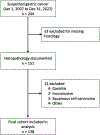Gastric Cancer at a Nigerian Tertiary Referral Center: Experiences With Establishing an Institutional Cancer Registry
- PMID: 39558548
- PMCID: PMC12629506
- DOI: 10.1002/jso.27993
Gastric Cancer at a Nigerian Tertiary Referral Center: Experiences With Establishing an Institutional Cancer Registry
Abstract
Background: In Nigeria, gastric cancer is the 10th most common and 9th most deadly malignancy. The limited availability of robust data makes further characterizing it challenging. The objective of this study was to assess the presentation, and management of gastric cancer in Nigeria using an institutional cancer registry.
Methods: We reviewed a prospective database of patients diagnosed with any gastric cancer at a single tertiary referral center over 15 years (2007-2022). Patients with suspected gastric cancer were surveyed for sociodemographics and then added to the institutional gastric cancer registry. Thereafter, periodic chart review and phone call was used to obtain investigation results, and survival data, respectively. Only patients with complete histopathology were included in analysis.
Results: 138 patients met inclusion criteria (mean age 55.3 years, 68.8% male). Patients typically presented with weight loss (119, 86.2%) and anorexia (92, 66.7%). Blood work (132, 95.7%) and ultrasound (80, 57.9%) were the most common investigations. Most fully staged patients presented with metastatic disease (39, 90.2%). Patients underwent at least one treatment modality (109, 79.0%), and most 54 (49.5%) underwent both chemotherapy and surgery. Patients undergoing surgery usually had resection of their tumor (58, 67.4%). The median time of follow-up was 45.6 months, and 51.4% (71) of patients were dead at that time point.
Conclusion: Our gastric cancer database identified that most patients present with advanced disease and are undergoing at least one treatment modality. The next steps include initiatives to strengthen the quality of registry data, identify high-risk patients, and provide timely treatment.
Keywords: gastric cancer; global surgery; registry data; sub‐Sahara Africa.
© 2024 Wiley Periodicals LLC.
Conflict of interest statement
The authors have no conflicts of interest to report. Data from this manuscript can be made available upon request. Ethical approval and patient consent was obtained for this study.
References
-
- Cancer statistics for the year 2020: An overview - PubMed n.d. https://pubmed.ncbi.nlm.nih.gov/33818764/ (accessed February 14, 2024).
MeSH terms
Grants and funding
LinkOut - more resources
Full Text Sources
Medical
Miscellaneous


